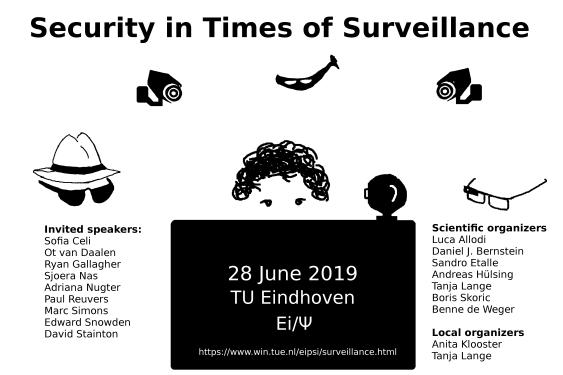General information
Staff
Seminars / Courses
Project involvement
Publications
Education
Press releases
Upcoming /
Past events
Job opportunities
Contact information
|

Abstracts:
Sofia Celi, Centro de Autonomia Digital
The loss of the sovereignty in privacy
Perhaps, one of the fundamental things that History has shown us is
the fact that the loss of sovereignty leads to a self proclaimed
liberalization imposed in the interests of the powerful, as Noam
Chomsky has stated. This loss does not only exist in regards to
countries or nations, but also in regards to individual human
rights. Over the last decades we have seen a will to annihilate the
individual right to privacy and the sovereignty of choosing it. And
this, as Chomsky pointed out, has been done in interest of the
powerful. Because of this, journalists, activists, lawyers, and
software developers fighting for this right have experienced increased
harassment and unlawful detentions all over the world, specially in
the Global South.
When cryptography was born, a part of it was developed with the idea
of giving people back this right to privacy in face of an ever
increased surveillance state. Today, decades later, we still have some
tools developed with those ideals in mind (PGP, OTR, Tor), but there
is a lot of work to be done. There is fundamental need for talking
about morality in the design of cryptographic algorithms and
protocols. There is an increase need of taking into account the
different countries where these protocols and algorithms will be
used. There is a crucial need to think about the fundamental threat
that activists face when working for privacy and how to help them in
their field. In this talk, we will outline what questions can be
inquired when developing cryptographic tools, which parts of the world
should be taken into account, and what new proposed versions are there
of the already created privacy-preserving tools (like the upcoming OTR
version 4).
Ot van Daalen, Institute for Information Law (IViR) and Root Legal
Evaluating crypto restrictions under EU human rights law
We have learned from the Snowden-revelations that the US and UK have
actively undermined cryptographic technologies. The Five
Eyes-countries have floated proposals to weaken crypto. Australia
recently adopted a law aimed at backdooring messaging
services. Germany is considering a proposal to force messenger
services, such as WhatsApp, to provide access to plaintext
communications. And goverments are investing in quantum technologies
to break strong encryption.
But cryptographic technologies are fundamental to privacy, freedom of
expression and information security. So how should we assess these
proposals and practices under European human rights law? And does
human rights law perhaps create obligations on governments to actually
support and protect these technologies?
Ryan Gallagher, The Intercept
Silicon Valley and China: US tech giants' complicity in the CCP regime's censorship and surveillance
Sjoera Nas, senior advisor Privacy Company
I know you didn't read the fine print!
If you use Microsoft Office 365, possibly in combination with Windows
10 Enterprise, what personal data does Microsoft collect about you?
And what does the fine print say about the purposes for which
Microsoft can process your data? At the request of the Dutch Ministry
of Justice, Sjoera Nas has performed data protection impact
assessments (DPIA) on the processing of data through Microsoft Office
365 ProPlus, Windows 10 Enterprise and the use of Azure VM's. In her
talk she will explain how she investigated the data protection risks
for users. This involved both technical analysis of the diagnostic
data and close reading of the fine print, the terms and
conditions. The key take aways from these assessments apply to all
contracts with IT providers.
Adriana Nugter, Guest Lecturer TU/e & Independent Senior Advisor
Everything under control? – The GDPR one year later.
The GDPR has been in force for one year now. So where are we?
Definitely some good things are happening. But will it be sufficient
as a tool to protect citizens in an age of increasing use of
biometrics and AI?
Paul Reuvers and Marc Simons, Cryptomuseum Eindhoven
Operation "Easy Chair" – How the Dutch helped the CIA to bug the Russian embassy
A small Dutch laboratory had a contract with the CIA to develop equipment for
the use of covert bugging for the CIA. We will tell about two brilliant
engineers who have developed all this and we will also explain how the
operation took place.
Edward Snowden, Freedom of the Press Foundation
Combating Online Surveillance
David Stainton, Core developer of the Katzenpost mix network
Introduction to Mix Networks
This talk will introduce the fundamental concepts of mix networks by
systematically describing attacks and defenses. Academics have
proposed various anonymity technologies with far stronger threat
models than Tor, but by far the most practical and efficient option
remains mix networks, which date to the founding of anonymity research
by David Chaum in 1981. Historically mix networks achieved enough mix
entropy by using long delays whereas it is becoming more widely
understood that there exists a trade off between legit traffic, decoy
itraffic and latency.
I shall mention the Katzenpost free software project and how it allows
developers to easily add network services to the mix network
supporting a wide variety of client applications including but not
limited to: cryptographic messaging, off-line browsing, transporting
interactions with DHTs, CRDTs, databases, crypto currency blockchains
etc. Join us in this new anonymity movement!
Back to main page for Security in Times of Surveillance with tweets and without tweets.
|



